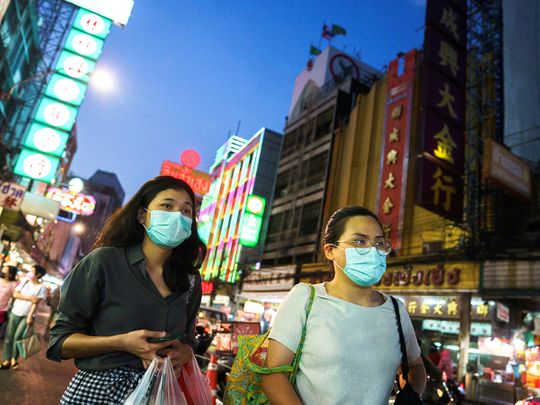
Thailand is rushing to vaccinate its elderly citizens and other vulnerable groups ahead of the local New Year celebrations as the festivities are seen fueling a surge in Covid cases and deaths, potentially derailing a tentative economic and tourism recovery.
Millions of Thais will travel to their hometowns this week from cities such as Bangkok to join families in celebrating Songkran, the first time they can do so without any travel curbs since the outbreak of the pandemic. That's prompted the Health Ministry to warn new daily cases could jump to as high as 100,000 a day from around 20,000 on Monday.
A booster-dose campaign for the elderly saw an estimated 500,000 people get inoculated in the past three weeks, taking the total number of those above 60 with three shots to 3 million. But there's a long way to close the gap as the Southeast Asian nation has an estimated 11 million senior citizens, Health Ministry data show.
With only about 35% of the 70 million Thai population receiving booster shots, Prime Minister Prayuth Chan-Ocha on Monday urged people to adhere to Covid protocols to prevent a spike in cases after the long holidays. That's key to the tourism-reliant nation's efforts to further relax visa rules for foreign visitors.
"There will be a lot of parties and meetings during Songkran and we expect there will be a lot more infections," Health Minister Anutin Charnvirakul said last week. "But vaccines can help reduce the risk and we are asking people to cooperate, so the nation can get over this risky period."
A flare-up in infections could potentially bring back more restrictions and scuttle a fragile economic recovery that's already facing headwinds triggered by the Russian invasion of Ukraine. Most economists have trimmed Thai growth forecasts in recent weeks while predicting a second straight year of current account deficit on a bleak outlook for a recovery in tourist arrivals.
"We are concerned about a sharp rise in new infections after Songkran," said Nattaporn Triratanasirikul, an economist at Kasikornbank's research unit. "The higher the cases, the longer it will take for the outbreak to stabilize and delay the plan to declare it as endemic. But the impact will be less than the forced lockdowns we faced in the previous years."
Even if new cases flare up, the nation's health care system will still be able to cope as the high rate of vaccination will prevent severe infections and the need for hospitalization, according to Chakkarat Pittayawonganon, director of the Bureau of Epidemiology. The bureau expects cases to stabilize in May.
Prayuth's government, which has followed a strategy of living with Covid since October by gradually ending most of the mobility restrictions, is seeking a balance between public health and the economy. It aims to declare the outbreak endemic by July if it can keep daily new infections to a few thousand and fatalities below 80 a day.











